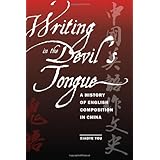
Average Reviews:

(More customer reviews)Are you looking to buy Writing in the Devil's Tongue: A History of English Composition in China? Here is the right place to find the great deals. we can offer discounts of up to 90% on Writing in the Devil's Tongue: A History of English Composition in China. Check out the link below:
>> Click Here to See Compare Prices and Get the Best Offers
Writing in the Devil's Tongue: A History of English Composition in China ReviewAs a Chinese teacher and researcher of the English language, I've been puzzled by two questions for years: Why were there more Chinese masters of English literacy in the past generation than today? How should we view the role of our rhetorical and linguistic background in the use of English? Luckily enough I've found the answers in Prof. You's book "Writing in the Devil's Tongue: a History of English Composition in China"The English pedagogy in the mission schools in early 20th century China has always been mysterious to the current professionals of the English language. People just find graduates from those schools had the best command of English in Chinese history, but don't know why. And amazingly enough, this book has managed to open this black box. This book provided the readers with sufficient evidence to account for the scholastic excellence achieved by masters, such as the late Professors Qian Zhongshu, Xu Guozhang and Ge Chuangui. These prestigious scholars were brought up in different parts of China, but shared some commonalities in their educational background: they all received their secondary education in the mission schools. Thus English pedagogies at that time in the mission schools in China is drawing more and more attention and sheds light on the current English teaching reform in China.
In addition, Professor You advocates the recognition of the value of non- native students' own rhetorical, linguistic and cultural traditions. In this spirit, our past experiences are no longer burdens to overcome, but unlimited resources to capitalize on. I talked about this view with my Chinese colleagues, and we all feel encouraged by such positive treatment of our cultural heritage.
Writing in the Devil's Tongue: A History of English Composition in China OverviewUntil recently, American composition scholars have studied writing instruction mainly within the borders of their own nation, rarely considering English composition in the global context in which writing in English is increasingly taught. Writing in the Devil's Tongue challenges this anachronistic approach by examining the history of English composition instruction in an East Asian country. Author Xiaoye You offers scholars a chance to observe how a nation changed from monolingual writing practices to bilingual writing instruction in a school setting.
You makes extensive use of archival sources to help trace bilingual writing instruction in China back to 1862, when English was first taught in government schools. Treating the Chinese pursuit of modernity as the overarching theme, he explores how the entry of Anglo-American rhetoric and composition challenged and altered the traditional monolithic practice of teaching Chinese writing in the Confucian spirit. The author focuses on four aspects of this history: the Chinese negotiation with Anglo-American rhetoric, their search for innovative approaches to instruction, students' situated use of English writing, and local scholarship in English composition. Unlike previous composition histories, which have tended to focus on institutional, disciplinary, and pedagogical issues, Writing in the Devil's Tongue brings students back to center stage by featuring several passages written by them in each chapter. These passages not only showcase rhetorical and linguistic features of their writings but also serve as representative anecdotes that reveal the complex ways in which students, responding to their situations, performed multivalent, intercultural discourses. In addition, You moves out of the classroom and into the historical, cultural, and political contexts that shaped both Chinese writing and composing practices and the pedagogies that were adopted to teach English to Chinese in China. Teachers, students, and scholars reading this book will learn a great deal about the political and cultural impact that teaching English composition has had in China and about the ways in which Chinese writing and composition continues to be shaped by rich and diverse cultural traditions and political discourses.In showcasing the Chinese struggle with teaching and practicing bilingual composition, Writing in the Devil's Tongue alerts American writing scholars and teachers to an untimely English monolingual mentality and urges them to modify their rhetorical assumptions, pedagogical approaches, and writing practices in the age of globalization.
Want to learn more information about Writing in the Devil's Tongue: A History of English Composition in China?
>> Click Here to See All Customer Reviews & Ratings Now
0 comments:
Post a Comment